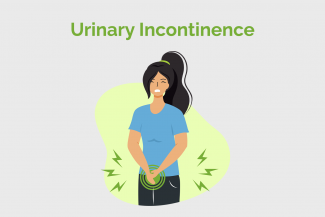
Causes of urinary incontinence
It is not a disease, it is a symptom. Urinary incontinence can be caused by daily habits, underlying medical or physical problems.
Urinary incontinence may be temporary or persistent.
Temporary urinary incontinence
Certain drinks, foods and medications can act as diuretics by stimulating your bladder and increasing volume of urine. These include:
- Alcohol
- Caffeine
- Decaffeinated tea and coffee
- Carbonated drinks
- Artificial sweeteners
- Corn syrup
- Foods high in sugar, spice, acid (especially citrus foods)
- Medications used for cardiac and hypertensive patients, sedatives and muscle relaxants
- Large doses of vitamin-B & C
- Urinary tract infection: Infections can irritate your bladder, causing you to have a strong urge to urinate.
- Constipation: The rectum is located close to the bladder and shares many of the same nerves. Hard stool in your rectum causes these nerves to be over-active and increases frequency of urine.
Persistent urinary incontinence
A persistent problem may be caused by the following:
- Pregnancy – The increased weight of the uterus and hormonal changes during pregnancy can cause urinary incontinence.
- Childbirth – Vaginal delivery can weaken muscles, nerves and supportive tissue leading to incontinence.
- Changes with age – Ageing of the bladder muscle decreases the bladder capacity to store urine leading to incontinence.
- Menopause - In normal conditions, oestrogen helps to keep the lining of the bladder and urethra healthy. In women after menopause, the drop in oestrogen production may lead to incontinence.
- Hysterectomy – Surgical removal of the uterus can damage the pelvic floor muscles, which may lead to incontinence.
- Enlarged prostate – In older men incontinence occurs due to enlargement of prostate gland.
- Prostate cancer – Urinary incontinence is a side effect of treatments for prostate cancer.
- Neurological disorders – Multiple sclerosis, Parkinson’s disease, stroke, brain tumour or spinal injury
- Diabetes – Excess body weight, nerve damage, impaired immunity and medication associated with diabetes may lead to incontinence.
Are you at risk of developing urinary incontinence?
Factors that increase your risk of developing urinary incontinence include:
Gender: Women are more likely to have urinary incontinence because of hormonal changes. Men with prostate gland problems are also at increased risk of urinary incontinence.
Age: As you become older, the muscles in your bladder and urethra lose some of their strength.
Overweight: Extra weight increases pressure on your bladder and surrounding muscles and weakens them resulting in leakage of urine when you sneeze or cough.
Other diseases: Neurological disease or diabetes may increase your risk of urinary incontinence











